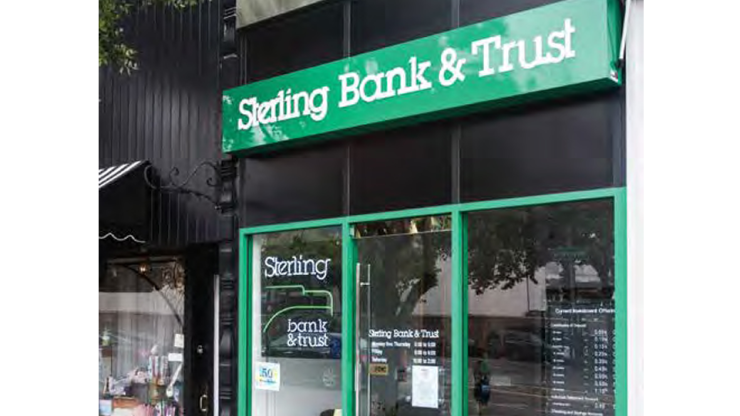
Sterling Bancorp's
"The timing was particularly hard, just given valuations were so low and the legacy history of Sterling and reputational issues," Chairman and CEO Thomas O'Brien said in an interview. "I would say [there was] not a lot of interest although a lot of outreach … We had some modest looks, but I couldn't say it was much more than that."
Much of the interest Sterling did receive came from "unique" suitors whose pitches proved unappealing, O'Brien said. "Regulatory approval, to us, was also a big consideration," he said. "We didn't want to sit in the application world of the OCC for a year, year-and-a-half because the buyer was a fintech. That's not in anybody's interest."
The $39.4 billion-asset EverBank entered the picture roughly a year ago, following a meeting at an industry conference. "We had some casual conversations late winter, early spring," O'Brien said. "They spent a lot of time looking and kicking the tires and talking. It got more and more interesting … during the course of the summer."

The two sides ultimately agreed on an all-cash transaction that calls for Sterling to sell its remaining mortgage loans and wind down operations, tasks that the 73-year-old O'Brien is determined to see through to a smooth conclusion. "My job is to do my best to deliver the bank they bought … to give EverBank the deal they paid for," he said.
A heavy lift
For O'Brien, who has been tapped
The Department of Justice claimed Sterling filed a series of false financial statements with the Securities and Exchange Commission, providing misleading information about Advantage Loan. The program was
Sterling hired O'Brien as CEO in June 2020, citing his turnaround experience. O'Brien's strategy was straightforward. Along with total cooperation with federal authorities, he worked to sell the Advantage Loan portfolio, boost capital to prepare for an inevitable fine, shed costly debt and make the bank as liquid as possible.
As part of its plea agreement with the DOJ, Sterling paid $27.2 million in restitution to non-insider shareholders.
"I wanted to make the bank as clean and as easy to understand as possible, so that when we got to the point where we were considering strategic options, we knew what we had," O'Brien said. "That's where we are today, good clean capital, clean balance sheet, good liquidity."
Sterling posted a profit of $1.3 million for the three months ended June 30 in its most recent earnings report. The company's leverage ratio was 14.26%, while nonperforming loans totaled 0.51% of total assets.
The decision to sell was clear when weighed against the cost of building new business lines, O'Brien said. "We figured that would be another $40 million to $50 million to build up new businesses, staff them, build all the internal controls," he said. "The more you got into it, the more prohibitive it was."
The $261 million sales price Sterling accepted amounts to little more than half its market capitalization from November 2019, just before the suspension of the Advantage Loan, a fact O'Brien is keenly aware of. In his view, there isn't enough accountability for executives who run banks aground. "If you're an executive, you're paid to be an executive, you're paid to be accountable. There's no shortcuts," O'Brien said. "I've picked up from a lot of people who took shortcuts [then] took the money and went home. I find that offensive."
Targeting California
EverBank was "aware of the legal issues around" Sterling but was confident it had made significant progress under O'Brien's leadership, said Michael Cosgrove, the Florida bank's senior vice president, public relations and corporate communications, in an interview.
"I think from our perspective, Tom has done a great job taking care of a number of the issues there," Cosgrove said. "We're confident it won't be a problem for the transaction."
For EverBank, Sterling's appeal lay in its geography. Though Sterling was founded and headquartered in suburban Detroit, it's developed a substantial footprint, including 28 branches, in Northern and Southern California, markets EverBank has been eyeing for expansion. It revived the Everbank brand last summer, following its sale by TIAA to a group led by five private equity firms. The new leadership team,
"With Sterling, I think we saw a great opportunity to significantly expand our footprint physically in California, which we view as a major growth market," Cosgrove said. EverBank expects to open two de novo branches in the Golden State this fall. Earlier in 2024, it opened an office in Irvine, where a number of senior executives, including President David DePillo, are based. Acquiring Sterling should "turbocharge" those growth plans, Cosgrove said.
"Taking a look at what Sterling brings to us, it's a very good fit for our balance sheet, a very good fit for our strategy," Cosgrove said.
EverBank is headquartered in Florida, where it operates nine branches, but operates largely directly with commercial and consumer customers throughout the country. "Our marketing is nationwide, our footprint is nationwide," Cosgrove said. "I think that next year when this transaction is closed and we start converting the Sterling branches into EverBank branches, it will be a great opportunity to market, particularly in the Bay Area, Los Angeles and Orange County. There's a lot of work ahead of us, but it's a great problem to have."
Into the sunset
O'Brien has no plan to continue with EverBank when the deal, expected to close in the first quarter of 2025, is completed.
"As the Lone Ranger says, my job is done," O'Brien said. "I hope people think I delivered on my promises."
While he does not have a new job lined up, O'Brien didn't rule out a return to banking. "You never know what happens. Sometimes you get a call and it's interesting … This isn't the end of the troubled bank world."





